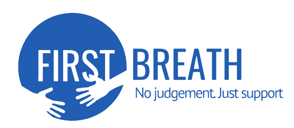First Breath is a free program that helps pregnant women in Wisconsin quit smoking. It is a program that includes monthly check-ins with a trained quit coach, counseling, and mostly importantly a plan. This program is available to all Moreland OB patients. The program is offered throughout the state by the Wisconsin Women’s Health Foundation, a non-profit organization. To get started, give our office a call at 262-544-4411.
As a First Breath participant, you will receive the following at no cost:


Can’t attend a class? Just click away on web-based support from the American Lung Association®.
Visit www.lungusa.org and click on the Stop Smoking tab. Scroll down and hit the join Freedom From Smoking option. Freedom From Smoking® Online is based on established behavior-change theory. Work through seven modules, containing five unique lessons. Download and complete activities to reinforce the messages and build commitment to quit.
Resources:
The Wisconsin Tobacco Quit Line supported by the Wisconsin Department of Health. 1-800-QUIT-NOW
The Quit Line is free. The Quit Line is for people who are ready to make a quit attempt, preferably within 30 days. It is part of a treatment program.
American Cancer Society (ACS). Offers information, news, and support to help you quit smoking.
CDC estimates that by the age of 50, 4 out of 5 women will have been infected by HPV during their lifetime. A male or female of any age who takes part in any kind of sexual activity that involves genital contact is at risk.
Many people who have HPV may not show any signs or symptoms. This means that they can pass on the virus to others and not know it.
Gardasil is a vaccine (injection/shot) that helps protect against the following diseases caused by Human Papillomavirus (HPV) Types in the vaccine (6, 11,16, and 18):
Gardasil helps prevent these diseases, but it will not treat them. You or your child cannot get these diseases from Gardasil. Gardasil is given as an injection. You or your child will receive three doses of the vaccine. Ideally, the doses are given as:
Source: GARDASIL
The Centers for Disease Control recommends that everyone over six months of age should receive a Flu vaccination every year. Please ask your medical provider about receiving the Flu shot at your next visit.
Source: Centers for Disease Control
Tetanus, diphtheria, and pertussis can be very serious diseases, even for adolescents and adults.
Tdap vaccine can protect adolescents and adults from tetanus, diphtheria, and pertussis. One dose of Tdap is routinely given at age 11 or 12. People who did not get Tdap at that age should get it as soon as possible. After that, you’ll need a Tdap booster dose every 10 years.
Tdap is especially important for health care professionals and anyone having close contact with a baby younger than 12 months.
Pregnant women should get a dose of Tdap during every pregnancy preferably between 27 weeks and 36 weeks of gestation. The Tdap vaccine is an effective and safe way to protect you and your baby from serious illness and complications of pertussis. Infants are most at risk for severe, life-threatening complications from pertussis.
Tdap vaccination is available at our clinic for women of all ages. Ask your provider for more information on the Tdap vaccine.
Source: Centers for Disease Control and American College of Obstetricians and Gynecologists
Phone: 262-544-4411
Fax: 262-650-3856
Monday-Thursday:
7:30 am – 6:00 pm
Friday:
7:30 am – 4:00 pm



